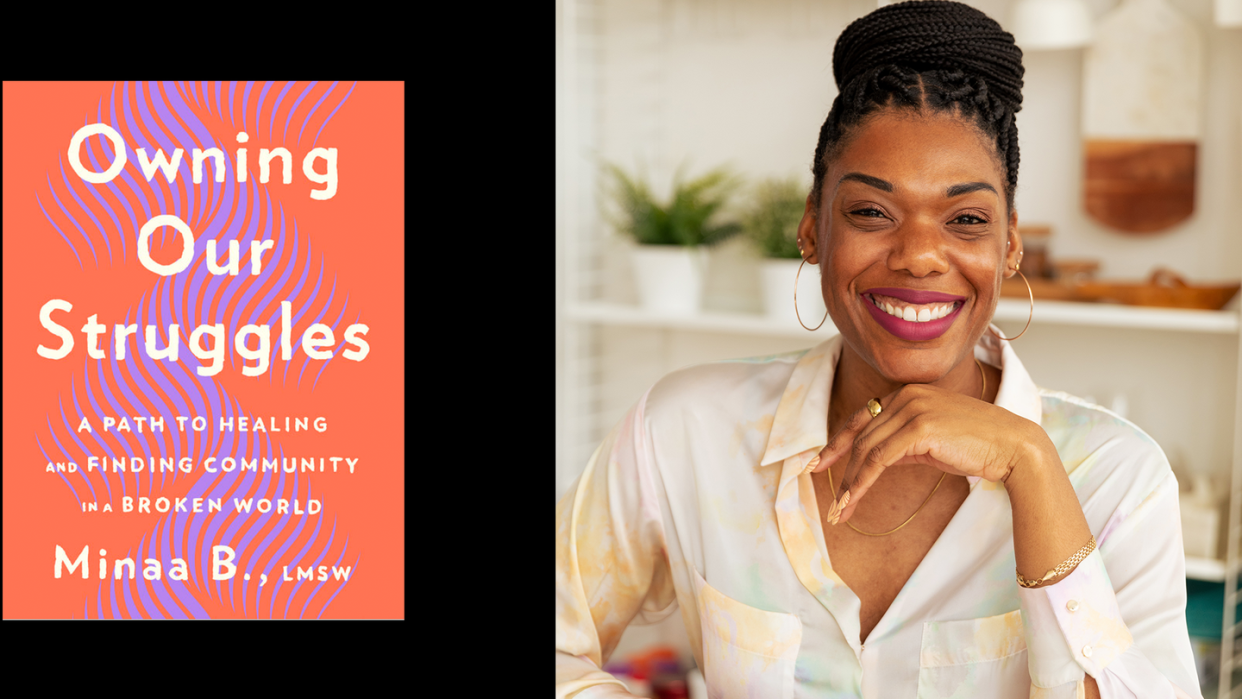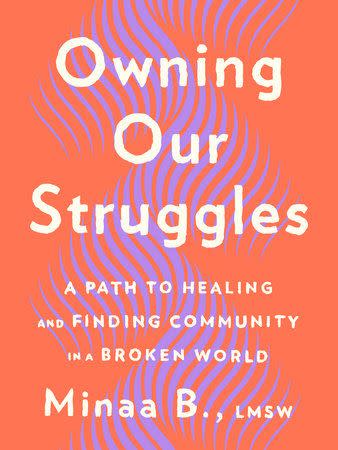Hey, It’s Okay to Lean Into Your Uncomfortable Feelings—Being Happy All of The Time Is Actually Super Unrealistic

For the last year or so, therapist Minaa B. has been dropping gem after gem in our “Free Therapy” series, an advice column where she answers a slew of reader (and editor!) questions on just about every sticky situation you can imagine. She has guided us through everything from workplace dilemmas and friendship squabbles to annoying siblings and unreasonable parents. She’s truly seen and heard it all.

Owning Our Struggles
penguinrandomhouse.com
$28.00
Now, in her brand-new book, Owning Our Struggles, Minaa shares more of her sage wisdom and then some. I mean, just take a look at the book’s official description from Penguin Random House:
Adversity comes in many forms, and can make us feel alone in our pain, even years after the fact. But as wellness coach and licensed therapist Minaa B. observes, we can’t heal in isolation. The best way to move past individual trauma is through connection and community—healing ourselves and one another.
In this powerful and practical guide, Minaa shares therapeutic tools, client stories, and actionable insights to help you on your healing journey, along with reflections from her personal experiences. Each chapter focuses on a common emotional struggle—from overcoming dysfunctional family patterns to developing emotional maturity, finding our village, navigating racial trauma, and moving past isolation and despair.
Through her unique mix of deeply honest personal stories, proven practices, and prompts for writing and reflection, Minaa helps readers finally face their struggles, get unstuck, and transform their thinking—to claim agency in their own lives and circumstances, and to use that power to help heal a broken world.
Healing is whirlwind, and lots of emotions come up with it. Some of us may have positive associations with our feels, like knowing that taking a minute to healthily express anger or frustration doesn’t mean you’re the damn Hulk. And others may have received negative meanings attached to them, like that crying or being vulnerable equates to weakness.
Social media has, of course, played a role in this too. I’m sure one scroll has introduced you to the term “toxic positivity,” either directly or indirectly. The thought that you have to be happy no matter what and deny what you *actually* feel just sounds exhausting. And not sure about you, but faking the funk has never been my forte—forcing yourself to have a positive outlook on a situation when it is really shitty tends to take more emotional labor than just...being real about what you feel.
In an exclusive excerpt from Owning Our Struggles, Minaa goes into why it’s important to stop performing happiness and instead, lean into the feelings that, well, don’t typically feel good. Owning Our Struggles is on sale tomorrow, but check out the excerpt below JIC you need more convincing to go snag a copy.
An Excerpt from Owning Our Struggles
By Minaa B.
Chapter 2: The Struggle for Healing
“When Positivity Becomes Toxic”
Denise was tired, and she had a right to be, but trying to force herself to be happy when she knew she wasn’t was not going to lead her on a path to happiness; instead it made her more miserable because she kept having to suppress the truth of her sadness, anger, and frustration to present herself as happy, joyful, and grateful.
Trying to always remain happy is not only destructive but unrealistic. Emotions are not pieces of clothing that we can sort through and put on and take off when we feel like it. They are a byproduct of our experiences, a reaction to stimuli, and how we interpret those experiences and the impact they have on the brain. Though there is data to support a variety of core emotions, the basic six emotions we all experience are anger, fear, surprise, disgust, joy, and sadness. Consider these the parent emotions, and other feelings, like jealousy, depression, annoyance, frustration, and so on, are the children of one of these basic emotions.
The first myth about emotions that needs to be dispelled is that emotions are either good or bad. This myth has caused people to believe that it is distasteful to experience emotions such as jealousy or harmful to experience emotions such as anger or rage. The truth is, emotions are not harmful, but what we choose to do with our emotions can be. When emotions are not processed, or when we do not have healthy coping mechanisms in place to manage our emotions, it can lead to problematic behaviors that hurt others as well as ourselves. The inability to cope with our emotions can often come from judging our emotions. When we label emotions as bad, we assume we are bad people for feeling them instead of learning to accept and embrace that our feelings exist on a spectrum and the presence of an emotion has nothing to do with our value, worth, or morality. By labeling feelings, we put some on a pedestal and treat them as deities. We worship and crave happiness because we no longer see the value in rage and sadness. We’ve been taught these emotions are crippling to the spirit, useless, and even futile. This detachment from negative feelings causes us to overlook the value of the messages our feelings are trying to send us.
Every feeling has power and purpose. Blocking off certain emotions because we think they are bad means we are not stopping to investigate the intricacies of our humanity. Anger, rage, and sadness are not detached from passion and joy as much as we think they are. These emotions exist as storytellers. They signal to us that harm has been caused, and in some way, we feel as if we’ve been injured either physically, spiritually, or emotionally. Sadness and anger open our eyes to our own personal injustices, including the injustices of the world. If we choose to cut these emotions off, we are also choosing to turn a blind eye to the inequities happening to us and around us. I often think about these small but powerful words by singer Solange: “I got a lot to be mad about.”
Life is not always bliss; it is as full of darkness as it is of light. Giving ourselves permission to fold when necessary, instead of always trying to be strong and smile while our hurt is tearing us up on the inside is how we free ourselves from this self-oppression that is constantly weighing us down. Nobody gets a badge of honor for how happy they can be all the time. All this self-oppressed suffering for nothing. No reward. No prosperity. Just more misery, pain, and agony that eventually tear down both the mind and the body. We spend our days striving for happiness, not realizing that the road to happiness requires us to have a deeper sense of knowledge and understanding for why our rage and despondency exist in the first place. If you aren’t willing to explore the crevices and cracks of your suffering, you will struggle to reach wholeness.
From OWNING OUR STRUGGLES by Minaa B., to be published on August 22, 2023 by TarcherPerigee, an imprint of Penguin Publishing Group, a division of Penguin Random House, LLC. Copyright © 2023 by Minaa B.
Need Minaa’s help? Send all your burning Qs and pressing matters to her right here: COSMOFREETHERAPY@GMAIL.COM
You Might Also Like

